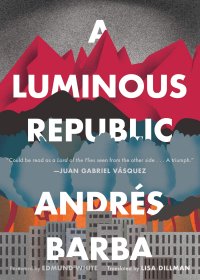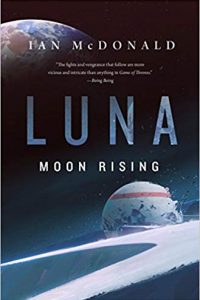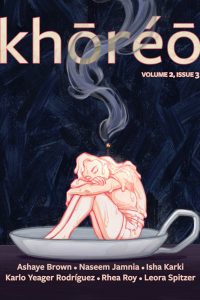Paul Di Filippo Reviews A Luminous Republic by Andrés Barba
 A Luminous Republic, Andrés Barba (Mariner 978-1328589347, $14.99, 208pp, trade paperback) April 2020
A Luminous Republic, Andrés Barba (Mariner 978-1328589347, $14.99, 208pp, trade paperback) April 2020
Nominated by Granta magazine as one of the best young Spanish novelists of his generation, and winner of several literary prizes, Andrés Barba is little-known, I think it is accurate to say, within our domain of fantastika. I am not sure if this is because his previous eight books (none of which I have encountered) have all been purely naturalistic, and thus outside our remit, or if he suffers from the common hinderances associated with being a non-Anglo writer in translation (in our specific case today, under the talented hands of Lisa Dillman). But whatever the cause for his lack of fame in our field, his new book should go a long way toward remedying that deficit of renown. It’s a wonderfully creepy and authentically different example of Modern Weird, and admirers of John Langan, Paul Trembly, Laird Barron, and, yes, J.G. Ballard will find much to excite their affections here.
We begin in the lulling, judicious, cerebral yet emotive first-person voice of our unnamed narrator. He is going to recount what happened to him and his city in the pivotal months spanning the end of 1994 and the start of 1995. We sense hurt and guilt and puzzlement in his voice, even twenty years later. Immediately, this distancing move puts the reader in the role of scientist or historian or anthropologist. (Maybe, it turns out, xeno-anthropologists, as in Michael Bishop’s “Death and Designation Among the Asadi”.) We will be watching events long resolved, through the scrim of time. But as we shall soon learn, this does not diminish the horror, but gives it a clinical heft. It’s precisely this voice and affect that make the book Ballardian, recalling such later JGB works as Super-Cannes, Millennium People and Kingdom Come. But also the book is thematically akin to Ballard’s concerns: alienation, hyper-reality, the overlay of decadence atop primal realities.
Our hero, still young, lives in an anonymous Latin American land. He is newly married to a woman named Maia, who has a daughter of the same name. The three of them relocate to Maia’s hometown of San Cristóbal, where the man gets a good government job, his wife teaches music, and the daughter fits in nicely at school. All seems idyllic.
The narrator takes time to sketch a portrait of San Cristóbal in bright details, making the place solid to our senses. Its river, the surrounding jungles, the indigenous tribal members, the architecture, the citizens—all are limned economically and with real substance. This allows the weirdness, when it comes, to stand out in vivid contrast.
Now, we might think that such a setting will lead us invariably to archetypical magical realism of the Gabriel García Márquez stamp. Eruptions of unicorns and shamans. Not so. Nothing that is literally uncanny ever happens. We are firmly in the twentieth century with all its pop-culture, consumerist, media-centric, rationalist trappings. But as in a Mervyn Peake book, the extremes of social behavior, of interpersonal relations can come to seem uncanny on their own.
What happens is that the small city finds itself suddenly host to a strange pack of gutter kids, precisely thirty-two in number, materializing out of nowhere. Waifs, orphans, runaways, outlaws, they throng the streets, begging, stealing, playing strange games. They have their own language and bizarre rituals, unknowable goals, and cannot be helped or tamed or captured. At first tolerated, then, after a deadly altercation, despised, they begin to colonize the psyches of the “normal” kids and the adults. Before long, the city feels besieged. The authorities know the populace demands action. But what? A deadly confrontation with the children in their hidden lair.
Barba’s prose relies heavily on rich and poignant aphorisms from its sensitive and self-doubting narrator. I could quote endlessly, but a few will have to suffice. “Certain words possess a viciousness that can linger for years, biding its time, before seeking us out again, as intense as when we first spoke them.” “Loss of trust is similar to heartbreak. Both lay bare some internal wound, both make us feel older than we are.” “Chronicles and narratives are like maps. On the one hand, you have the bold solid colors of the continents—collective episodes that everyone remembers—and on the other, the depths of private emotions, the oceans.” They lend philosophical depth to the action. And Barba’s precision in describing the weather of the psyche—both the narrator’s and those of the populace and the wild children—takes the reader on a rollercoaster of feeling. Consider this scene, where our hero confronts Maia’s ex-lover, the father of their daughter.
All my life I’ve been a tranquil man, but on the few occasions I’ve experienced violence—as I did in that moment— it has always manifested as a burning sensation in my skull. Suddenly words sound different, thoughts become emotions, you stop understanding how you got there; it’s like a feeling of dislocation. I shoved him so violently he nearly fell on his back. I was furious, but he was desperate. He sprung at me again and, because I didn’t realize what he was trying to do, I threw a flustered punch that landed at the top of his left ear. It was like hitting a horse’s flank and feeling the density of an animal’s bone against my knuckles. He didn’t even groan, simply straightened up, and with a humility that I couldn’t understand at the time (though I do now: it was the humility required of desperation), he slipped into my pocket the photo of his son. As I tried to catch my breath, still in a daze, we stood in silence for a few moments, unsure of what to do. He touched his hand to his ear and then looked to see if there was blood; I leaned on the riverwalk railing and glanced around, afraid that someone had seen us. There was no one. The Ere flowed past, tons of water producing a muted sound. I was ashamed of having hit him. He had simple eyes, a simple nose, a simple mouth and chin. He was the girl’s father. Now I knew I had nothing to fear. The man’s desperation was like the river’s presence, like the energy generated by that colossal mass carrying millions of tons of water and sand. He’d crossed some imposed limit. Wanted to ask him to forgive me but was unable to and took a step toward him. He didn’t move.
It’s this kind of forceful symbolic language embedded in action that imbues what might otherwise be a simplistic tale of bad-seed kids with haunting and haunted allegorical power.
The episodes that transpired over those months may have made us lose faith in the religion of childhood, but the children didn’t have it much easier, and they certainly weren’t waking up to a world any less hostile. For children, the world is a museum in which the adult guardians might be loving most of the time, but that doesn’t stop them from imposing rules: everything there is solid, everything has always already existed, long before them. In exchange for love, the children are required to uphold the myth of their innocence. Not only do they have to be innocent, they have to perform it.
Ultimately, Barba proclaims, we all move through enforced patterns toward unknown fates.
 While you are here, please take a moment to support Locus with a one-time or recurring donation. We rely on reader donations to keep the magazine and site going, and would like to keep the site paywall free, but WE NEED YOUR FINANCIAL SUPPORT to continue quality coverage of the science fiction and fantasy field.
While you are here, please take a moment to support Locus with a one-time or recurring donation. We rely on reader donations to keep the magazine and site going, and would like to keep the site paywall free, but WE NEED YOUR FINANCIAL SUPPORT to continue quality coverage of the science fiction and fantasy field.








